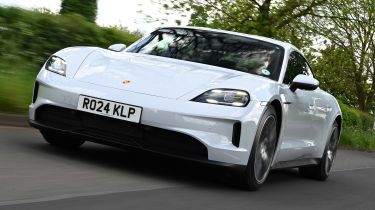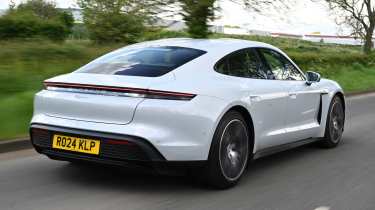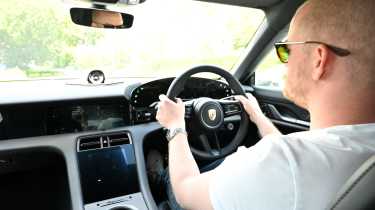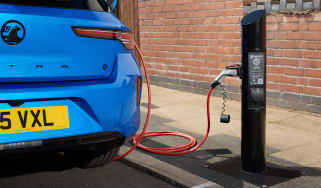New Porsche Taycan facelift 2024 review: fast, efficient and brilliant
The updated Porsche Taycan is faster to drive, charges quicker and is incredibly efficient

Verdict
Initial impressions would suggest that the revised Porsche Taycan hasn’t changed much from its predecessor; it’s still a striking four-door GT car that’s both comfy and sharp to drive. It’s not until you look at the numbers that improvements reveal themselves. Not only does it accelerate faster than before, but it’s even quicker to charge and can now legitimately claim to be one of the most energy-efficient cars that money can buy. This base car isn’t cheap, but it’s so good we’d find it hard to justify spending any more on variants higher up the range.
This is the new-for-2024 Porsche Taycan, and it’s faster than ever before. ‘Faster’ is a word that will leave many a little jaded at the moment; every new electric car seems to have even more performance than the last. In the case of the 2024 Taycan, however, it’s quicker in more ways than you might expect.
Not that the Taycan felt old-hat, even among the very finest EV competition, but pretty much its entire powertrain has been subjected to an overhaul. In the case of the entry-level model we’re driving here, that starts with a new motor.
Depending on its application the new unit can offer as much as 107bhp more than it did previously, but as standard it still makes the same 402bhp. In the case of the optional Performance Battery Plus option fitted to our car, output jumps to 429bhp – again, roughly the same as before.
As the name of that £4,454 option suggests, the capacity is increased from the standard 89kWh (82.3kWh net) to 105kWh (97kWh net). Those numbers are up from the previous 71kWh and 83.7kWh (net) of the outgoing car, but while capacity is up they haven’t grown in size, and the larger of those units is actually 15kg lighter than the previous big-battery option.
Used - available now

2024 Porsche
Taycan
24,280 milesAutomaticElectric
Cash £41,995
2024 Porsche
Taycan
29,550 milesAutomaticElectric
Cash £38,995
2024 Porsche
Taycan
40,000 milesAutomaticElectric
Cash £38,249
2024 Porsche
Taycan
53,100 milesAutomaticElectric
Cash £39,994Beyond the motor and battery, there’s also a revised inverter with tweaked software, improved cooling systems, a new heat pump and stronger brake recuperation.
So in what ways is it faster? Well, predictably, the 0-62mph time is the first thing to take a boost. Proving the improved efficiency of the powertrain, despite the matching power outputs, this base model now completes the dash in 4.8 seconds – a 0.8-second improvement over the old car. On paper, both standard and Performance Battery Plus models complete the sprint in the same amount of time, though the latter is apparently slightly quicker from a rolling start.
It charges faster, too. The Performance Battery Plus now replenishes at a maximum speed of 320kW – 50kW quicker than before. The smaller battery maintains the 270kW maximum, but both can now achieve those speeds not only across a wider window of its charge level, but also a wider range of outside temperatures. Porsche claims with an ambient temperature of 15 degrees, the new car can charge from 10-80 per cent in 18 minutes, even though those batteries are bigger than before.
And Porsche says you’ll need to recharge less often, because those systems deliver more efficiency, helped in part by a brake regeneration system that can recover as much as 400kW – up from 290kW before. Throw in aerodynamically-optimised wheels and a special low-rolling resistance Michelin Pilot Sport 4 tyres, and Porsche reckons that the new car is far more efficient than before.
But how does it all translate on the road? From a driver’s point of view, it feels largely the same. It’s quick, handles brilliantly, and thanks to the standard-fit air suspension, it’s got an even greater spread of dynamic talents than the previous Taycan had, too.
For a car weighing the best part of 2.2 tonnes, turn in is incredibly sharp, with most of that mass feeling like it’s centred right around your hips. Body roll is minimal, and the limits of grip, though high, are easy to approach thanks to the confidence you have to lean on the chassis.
The ride isn’t quite flawless; there’s just the slightest bit of jiggle over broken surfaces at most speeds, but the air suspension really helps it float over large bumps in a way you wouldn’t expect from such a low-slung four-door sports car.
The amount of braking done by motor regeneration is staggering now, with all but slightly panicked braking manoeuvres covered without using the discs and pads. The pedal feel could be better, though; a slight dead section at the top of the travel means that, for gentle braking (such as maintaining a car’s speed when going downhill) the regen initially engages more sharply than you’d like, forcing you to then ease off again to get the force that you’d like. This, along with the occasional jolt and clunk from that unusual two-speed gearbox, takes the edge off what is otherwise a wonderfully smooth driving experience.
But most astonishing of all is the very tangible improvement in efficiency. In our experience with earlier editions of the Taycan, we achieved around 3.0 miles/kWh depending on model. Granted, the dry, 20-odd-degree temperature we had during our time behind the wheel of this new model were pretty much the most flattering an EV could hope for, but even so, the 4.0mi/kWh that we averaged with predominantly motorway driving is a superb figure for a car with this much performance. On a steady 15-mile run along county roads, with speeds ranging between 30 and 60mph, it achieved a staggering 5.7mi/kWh. Even if your average moves towards the lower of those figures, a real-world range of 400 miles is on the cards.
The Porsche comes good on those charging claims, too. With around a quarter of its battery charge remaining, we saw it hit speeds of 262kW. We timed a 24 to 82-per cent charge in just 18 minutes.
There’s very little to separate the old model from new cosmetically, with only subtle styling changes at the front, which does mean it loses the gorgeous swoops on the outer edges of the headlights inspired by the original Mission E concept car. The new lights feature advanced matrix LED tech, while the rear light bar gets a three-dimensional look and a Porsche logo housed in the tail-lights. An illuminated badge is even available.
Like before, the Taycan is a snug four seater with modest boot space, but the cabin feels like a special place to sit. It’s been boosted with subtle tweaks to improve the usability of the infotainment system, and all versions now get the drive mode switch on the steering wheel. You can now even stream videos on the main central display (when stopped) or front passenger screen.
Prices for the new Taycan range start from £86,500 – an increase of £7,300 on the previous base model.
| Model: | Porsche Taycan Performance Battery Plus |
| Price: | £90,954 |
| Price from: | £86,500 |
| Powertrain: | 97kWh battery, 1x e-motor |
| Power/torque: | 429bhp/420Nm |
| Transmission: | Two-speed automatic, rear-wheel drive |
| 0-62mph: | 4.8 seconds |
| Top speed: | 143 mph |
| Range: | 420 miles |
| Charging: | 320kW (10-80% in 18 mins) |
| Size (L/W/H): | 4,963/1,966/1,379mm |
| On sale: | Now |






